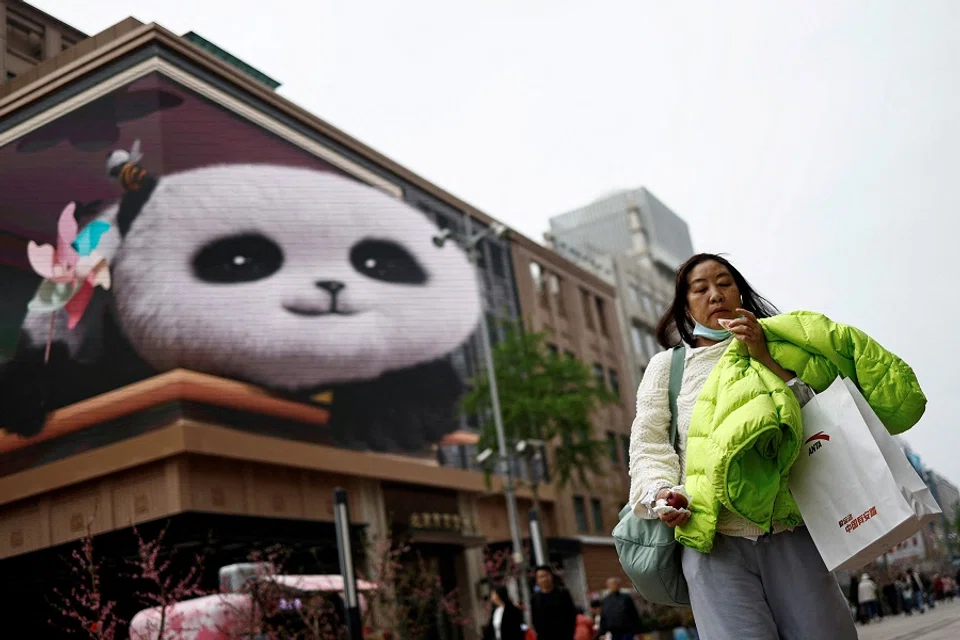China sets out new tasks to boost domestic consumption
Lianhe Zaobao correspondent Edwin Ong takes a look at the 20 key tasks set out by the Chinese State Council to boost domestic consumption across a wide range of sectors.

As China’s growth slowed to the worst pace in five quarters, on 3 August the State Council set out 20 key tasks to boost service consumption, calling for local governments to tap the potential of consumption in 11 sectors including entertainment, tourism, as well as education and training. It also called for ramping up credit support for key areas of service consumption to boost weak domestic demand, which continues to be a drag on economic growth.
Boost across multiple sectors
On 3 August, the State Council unveiled a guideline on boosting the high-quality development of service consumption (《关于促进服务消费高质量发展的意见》), calling for local governments to tap the potential of “basic consumption”, i.e. the catering industry, housekeeping services and elderly care. Measures will also be taken to boost the vitality of “life-enhancing consumption”, i.e. entertainment, tourism, sports, education and training, as well as residential services. The growth of “new types of consumption”, i.e. digital, green and health services, will also be fostered.
Issued on 29 July, the document also called for boosting film-related consumption, upgrading the quality of online literature, performances and games, and encouraging the development of new industries such as cruise ships, yachting, RV camping and low-altitude flying. It urged the ramping up of the development of new business forms such as unmanned retail stores, self pick-up lockers and cloud lockers, as well as support for the development of e-sports, social commerce and livestreaming e-commerce.
In terms of education and training, the 20 key tasks called for vocational training institutes to improve service quality in response to public demand. It also guides schools to introduce quality after-school services for non-academic subjects provided by third-party organisations for the public good.

Amid the property market slump and weak consumer spending, China’s growth unexpectedly slowed to the worst pace in five quarters. Consumer price index has been hovering near zero for the past few months, indicating lingering deflationary pressures.
The government hopes that these privately owned enterprises will play an important role in China’s new stage of economic development. — Associate Professor Fu Fangjian, Lee Kong Chian School of Business, SMU
Role of private sector
At an executive meeting of the State Council on 31 July, Chinese Premier Li Qiang called for efforts to optimise macro policies and strengthen macro regulation, stressed the importance of implementing existing policies, and prompted efforts to explore and introduce incremental policies.
Li also asked for the concentration of resources and efforts to tackle the issues, and to achieve more substantive breakthroughs in expanding domestic demand, nurturing emerging and future industries, and promoting high-standard opening up.
In a rare move, Chinese economist Huang Yiping published an article on 1 August that criticised the country’s economic policy for being too conservative. He called on the government to distribute money to citizens to boost consumption growth.
Fu Fangjian, an associate professor with the Lee Kong Chian School of Business at Singapore Management University (SMU), told Lianhe Zaobao that since China’s economic growth rate is lower than market expectations, this has put pressure on the central government to introduce more policies.

After expanding its monetary policy by implementing two rate cuts in late July to stimulate the economy, the government is currently maintaining a proactive policy stance. It hopes to stimulate consumption through the 20 key tasks across various fields, demonstrating its determination to save the macro economy and emphasising the importance of relying on consumption to drive domestic circulation.
Fu read the 20 key tasks as encouraging support for the internet economy and education sectors in particular, which is a tacit acknowledgement that the previous blanket crackdown on these industries was too simplistic and somewhat inappropriate. The government hopes that these privately owned enterprises will play an important role in China’s new stage of economic development.
Since the second half of 2021, the Chinese government has been continuously regulating high-growth industries such as the internet, education, entertainment and real estate. This has affected industry giants such as Tencent and Alibaba, which used to be a major source of employment for university graduates, and led to a shortage of jobs in the service sector, including business, finance, media and technology.

The 20 key tasks also clearly outline measures to boost consumption, including encouraging international renowned food and beverage brands to open their first or flagship stores in China, expanding the scope of visa-free countries, and providing diversified payment services.
... the government’s move is aimed at increasing financial support to deepen the pockets of enterprises and consumers, while also forking out real cash to encourage young people to have children. — Fu
Deepening pockets of enterprises and consumers
The document also requires local governments to increase credit support for key areas of service consumption, encourage government-backed financing guarantee institutions to provide financing and credit enhancement support for small and micro enterprises and individual businesses in the service sector. Special additional deductions for personal income tax, such as childcare for children under three, children’s education and elderly care, should also be implemented.
Fu analysed that the government’s move is aimed at increasing financial support to deepen the pockets of enterprises and consumers, while also forking out real cash to encourage young people to have children.
He believes that while China’s economy needs more consumption-driven growth in the long run, it more urgently needs to address the persistent problem of wealth inequality. It should also redistribute wealth, with higher taxes on the rich and more benefits for the working class, so that more people will be able and willing to spend.
This article was first published in Lianhe Zaobao as “中国出台20条促消费 分析:电商、游戏、教培重获重视”.





